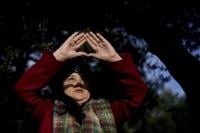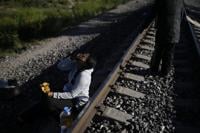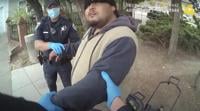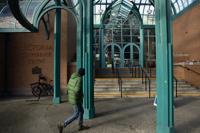CAPILLA DEL MONTE, Argentina (AP) — In the pope’s homeland, there’s a woman who believes in angels and calls them aliens. Another who proudly identifies as a witch.
And a spiritual guru so turned off by the Vatican’s opulence that he left the church to help others connect spiritually outside organized religion.
All three are former Catholics who have joined many other Argentines in the growing ranks of the religiously unaffiliated. Known as the “nones,” they identify as atheists, agnostics, spiritual but not religious, or simply, nothing in particular.
Pablo Robles says a better label for him would be “all,” since he has a rich spiritual life outside religion.
Robles grew up Catholic but became disenchanted while visiting the Vatican in 2000. At a papal Mass, he listened to a sermon on humility — and found himself questioning how the church’s vast wealth conflicted with that message.
“I was next to a gold column larger than my apartment,” Robles said. “It just unsettled me so much that I said: ’This is not the truth.’”
Back in Argentina, he began searching for answers in astrology, Buddhism and Sufism, the mystical side of Islam. He now uses music, yoga and reiki to help others connect spiritually.
Most Latin Americans are Christian, and Catholicism remains the dominant religion; about two-thirds of Argentina’s 45 million people identify as Catholic. But the influence of the church has waned. There’s discontent following clergy sex abuse scandals and opposition to the church’s stances against abortion and LGBTQ rights.
More Argentines are seeking spiritual answers beyond the church.
“The growth of those without a religion of belonging in the pope’s country is very striking,” said Hugo Rabbia, a political psychology professor at the ���ϳԹ��� University of Cordoba.
He said the percentage of people who don’t identify with a religion in Argentina doubled within the last 15 years. That growth is in line with other parts of the world.
“It coincides with a series of public debates on sexual and reproductive rights that have strongly influenced the position of some people regarding traditional religions.”
Monsignor Sergio Buenanueva, a bishop in Argentina’s Cordoba province, said the church must be less judgmental to reach out to the nones, especially young people.
“We must be there where the young are … where the people are suffering,” he said. “Not approaching them with an attitude of judges who come to judge the moral behavior … but valuing what Jesus valued in people.”
Disenchantment with the Catholic Church has led some to join a movement to formally quit the faith. Among them is Lin Pao Rafetta, who is part of the Argentine Coalition for a Secular State, which has led the
“I started to have a series of reasons to abandon the institution,” said Rafetta, who was fired from a Jesuit university after renouncing the faith.
Even as increasing numbers of Argentines say “none” when asked about their religion, Rabbia said many still hold to some of the beliefs without being part of the church.
“There’s an increasingly significant group of people linked to new spiritualities,” he added.
Nowhere is that more evident than in Argentina’s spiritual hub of Capilla del Monte. Located in Cordoba province, about 500 miles (800 kilometers) northwest of Buenos Aires, the town is known for attracting powerful energy, and some say, even extraterrestrial activity.
On a recent day, a group gathered at a plateau overlooking Uritorco hill, where some believe an alien city is buried.
“Seven years ago, I started this spiritual journey when I came to Capilla searching for UFOs,” said Fabian Kloss, who attended a Catholic school but left the religion to pursue a spiritual path. “I’ve felt so much peace, love and goodness here, and I realized that I wasn’t searching for UFOs, but for meaning in life.”
Ana Ottobre, 27, grew up singing in a Catholic choir on Saturdays and attending Mass on Sundays. But she felt constricted: “I wanted to get a tattoo and my grandma would say: ’That’s from the devil. Your body is sacred. God wouldn’t approve.’”
At 18, she declined to prepare for confirmation. She became a tattoo artist, and now proudly identifies as a none and a witch.
“This whole holistic world is made up of beautiful people who are looking for their personal evolution,” she said. “There’s this thing about wanting to improve and help other people on their spiritual path.”
Argentina shares many historical and cultural similarities with its neighbor, Uruguay. Their capitals, Buenos Aires and Montevideo, are on the shores of the River Plate where the tango was born in the 19th century. Both nations cherish gaucho or cowboy culture, and some people worship soccer as a quasi-religion. But religiosity is markedly different across the river.
In Uruguay, a nation of some 3.3 million people, more than half identify as atheist, agnostic or religiously unaffiliated — the highest portion in Latin America.
“It’s incredible for anyone who sees it from outside, but for us, it’s a given,” said Valentina Pereira, a professor at Uruguay’s Catholic University.
“Religion doesn’t visibly hold an important place in Uruguayan society.”
Uruguay has a long history of secularization. In the early 20th century, the country banned any mention of God in oaths of office and removed crucifixes from public hospitals, Pereira said. Then holidays were secularized. While Holy Week is the most sacred time of the year for millions worldwide, in Uruguay, it’s known as Tourism Week. Christmas? It’s Family Day.
Juan Castelli, a 22-year-old software engineer from Montevideo, recalled reading the Bible and praying at nighttime until age 15 when he stopped believing in God.
“I don’t know anyone who goes to church,” said Castelli, a former Catholic who identifies as atheist. He acknowledged that some churches help those struggling with poverty and addiction. But religions, he said, can be harmful, especially when mixed with politics.
“I believe in reason, in science,” he said.
A half hour’s drive from Montevideo lives Uruguay’s best-known atheist: former President Jose Mujica. Now, 88, and across the political spectrum for his simple ways. The former guerrilla leader, who was nominated for the Nobel Peace Prize, donated most of his salary to charity and declined to live in the presidential palace.
Interviewed at his flower farm, he reflected on the global rise of the religiously unaffiliated.
“I see all religions as very arrogant because the universe’s magnitude is so brutal, and yet they try to place humans as the epicenter.” Mujica said. “Since we don’t want to die, we need to build something that creates the illusion that not everything ends here … I believe we come from nothing. Heaven, and also hell, is right here.”
__
Associated Press religion coverage receives support through the AP’s with The Conversation US, with funding from Lilly Endowment Inc. The AP is solely responsible for this content.








































